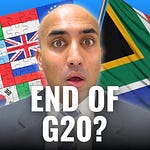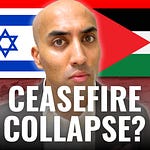WHAT IS IN TODAY’S INSIGHT?
Quick Read
Why Did Iran Do This?
What Were Iran’s Objectives?
What Will Israel Do?
What Will Iran Do?
Global Consequences
Actionable Takeaways
INTRODUCTION
On October 1, as Israeli forces moved deeper into southern Lebanon, US intelligence began seeing signs that Iran was preparing something. It started with the movement of missiles. Then, Washington warned that Iran could launch at Israel imminently. Suddenly, around 180 ballistic missiles rained down on Israel, along with rockets and drones, prompting Israel and American air defenses to activate, igniting the night sky over Israel with orange and yellow explosions.
All of the cliche words apply now: historic, watershed, significant, unprecedented.
Where the Middle East has arrived at, is exactly where most have tried to steer away from.
This is completely different from what took place in April when Iran launched at Israel largely as a face-saving measure. This is not the case now. What has happened has opened the door to a major conflict in the region, whose shockwaves could be felt globally.
1. QUICK READ (5 KEY POINTS)
On October 1, Iran struck Israel with over 180 ballistic missiles, attacking cities across Israel, but mainly Tel Aviv, to avenge the death of Hassan Nasrallah, the head of Hezbollah.
While most of the Iranian missiles were intercepted, many missiles hit their targets. From some vantage points, Iran’s launch at Israel is “an act of war.”
The ball is in Israel’s court about what to do, including a direct retaliation on Iran. For now, Israel has used the typical line that many governments employ in such moments: we will respond at a time and place of our choosing.
There are no easy options for Israel or Iran. Even an Israeli strike on Iranian nuclear facilities could result in an Iranian strike on Israeli critical infrastructure, like gas fields.
All ideas of stability returning to the Middle East are effectively dead, as Iran’s attack opens the door to a new kind of conflict between Tel Aviv and Tehran that could bring new disruptions and derailments.
2. WHY DID IRAN DO THIS?
There are two reasons why Iran carried out the strikes against Israel.
First, the attack on Hassan Nasrallah, the chief of Hezbollah, along with Israel’s rapid takeout of senior Hezbollah leadership, has put all eyes on Tehran. How will Iran aid its most well-armed, well-equipped, and well-trained proxy group?
Second, the attack on Ismail Haniyeh, the chief of Hamas, in Tehran itself during the Iranian presidential inauguration, almost forced Iran’s hand. However, due to global pressure, Iran backed down.
These compounded together means that Iran had to take some action. It was simply a question of whether Tehran would “pinch” or “punch” Israel. And when Israel took out the head of Hezbollah, it effectively forced Iran and Hezbollah’s hand. It is clear that Iran has chosen to punch.
3. WHAT WERE IRAN’S OBJECTIVES?
Unlike in April, when Iran gave forewarning, allowing Israel and its allies to prepare their air defense, today Iran went from movement to launch in the span of hours, giving little indication to the world until the last minute. And, unlike in April, when ballistic missiles represented a small amount of Iran’s attack, today, ballistic missiles compromised a bulk of the Iranian arsenal.
These are not small details. Clearly, Iran wanted to inflict pain. Likely, Iran wanted to hit military compounds in Israel that have been pivotal to operations against Hezbollah in Lebanon.
However, like in April, the majority of Iran's missiles were intercepted by Israel, the US, and even Jordan.
4. WHAT WILL ISRAEL DO?
What Israel does next depends on where Israel is at in its own thinking. And, at the core of Israel’s logic is a simple question: does Israel want to fight a war with Iran?
If Israel is ready for such a showdown, then there are two paths forward.
First, and widely discussed, Israel can retaliate by going after the Iranian nuclear weapons infrastructure, long viewed as a threat by Israel and the West. After Iran’s strike today, Israel has an effective “carte blanche” to move against Iran. However, should Israel take this option, it could trigger Iran and its proxies to go after Israeli critical infrastructure, from gas fields to desalination plants.
Second, Israel could strike non-nuclear Iranian military targets within Iran itself, along with Iranian government compounds in other countries, like Syria or Iraq, mimicking what took place on April 1, when Israel struck an Iranian government compound in Damascus, forcing Tehran to retaliate directly against Israel for the first time in history.
If Israel does not want war, then there are two paths forward.
First, Israel could retaliate against Iran by going after Iranian proxies, taking out whatever is left of Hamas, going after remaining Hezbollah strongholds, and launching a new front against the Houthis. The goal would be to decimate Iran’s tentacles and, by doing so, inflict pain on Iran itself.
Second, Israel can mimic what it did in April after Iran struck, when Israeli forces launched a small retaliation within Iran itself. It was purely optical. And the tensions between Israel and Iran fizzled out. This would enable Israel to focus entirely on the fight with Hezbollah, and not overextend its resources.
Behind all of this, however, is a completely separate play by Israel, revealed by comments prime minister Benjamin Netanyahu made just 24 hours ago: When Iran is finally free, and that moment will come a lot sooner than people think — everything will be different.
Whatever Israel does next could involve some calculations of how it could begin to push the Ayatollah out of power and foment some kind of change of government in Iran.
5. WHAT WILL IRAN DO?
Iran faces a historic challenge to its power and footprint. Its proxy groups are being broken (i.e. Hamas, Hezbollah), its partners seem distant (i.e. Russia, China), and its options are limited.
It has to shield its country and interests without getting involved in a full-blown war with Israel and by extension the US. This is not a fight Iran can win. Although Iran carries “nuclear cards” like closing down the Strait of Hormuz that it can play at any moment, these are options reserved for a full-blown war where everything is on the line. Shutting down the Strait of Hormuz does as much damage to Iran as it does to the global economy.
Iran has to figure out the right way to retaliate against whatever Israel does next, including direct strikes on Iranian targets, without pushing the situation too far. And this could see Iran taking a far less aggressive stance in retaliation whilst upping the ante through its proxies.
In particular, the focus could now turn to the Houthis, the last remaining proxy group that is standing strong, with its leadership intact. Whether this means Iran equips the Houthis with Russian anti-ship missiles (currently part of the discussions between Moscow and Tehran) or begins moving ballistic missiles whose launch is coordinated with Hezbollah and Iran, the Houthis could become a main outlet that Iran goes after Israel through, not a peripheral one.
6. GLOBAL CONSEQUENCES
The Iranian strike on Israel, and before this, the Israeli strike on the Hezbollah chief, make it clear that the West is no longer in the driver’s seat.
In fact, the West is not even in the same car. They are in the vehicle behind, trying to play catch up. In this case, Israel is taking unilateral action to achieve its geopolitical goals. This is not only unprecedented, it also means that the West has to begin to recalculate its exposure on other fronts from Europe to Asia, in a bid to defend Israel from potentially massive blowback.
Alongside the West, there are big questions for the entire Arab world. Like in April, Jordan played a significant role in intercepting the Iranian missiles before they hit Israel. For Iran, hoping to strike Israel, Arab countries are now “coming in the way.” This puts Arab nations in the crosshairs of Iran in a new way, as the flare-up with Israel enters a new chapter.
Whether it is fomenting social unrest or regime change, Iran might follow through on promises to go after nations who shield or protect Israel, including those in the Middle East.
Alongside all of this are big questions for the likes of Russia, China, India, and, separately, BRICS as a bloc.
Countries like Russia and China are the biggest backers of Iran, and with the addition of India, these three nations have invested massive sums to drive key geoeconomic projects, from India’s Chabahar Port to Russia’s International North–South Transport Corridor (INSTC).
A “disrupted Iran” threatens projects that emerging powers are driving. In the case of Russia and China, a weakened Iran presents a big challenge to Moscow and Beijing’s push to rival the West.
For BRICS, the group inducted Iran this year, as a full-member. And yet BRICS is not just silent, it seems nonexistent in the current Israel-Iran flareup. This is dangerous optics. If a G7 member was under attack, the entire G7 would stand up in support. Why hasn’t BRICS come to the defense of its member?
Lastly, diplomacy in its current form is dead. There is no more space to “walk back.” Tensions have reached a boiling point. The pressure cooker is exploding. Diplomats seem unable to turn nations around or “sell” peaceful resolutions.
In the current geopolitical environment, diplomacy is out. And war is in.
7. ACTIONABLE TAKEAWAYS
Operating in the Middle East now means operating in a war zone. There is no more peaceful Middle East or a Middle East defined purely by growth or development. What is taking place between Israel and Iran will not wrap up overnight, it is the start of a major regional fight, that will draw in countries and proxies throughout the Middle East. The entire Middle East is increasingly being defined and driven by conflict.
Asymmetrical warfare will be employed by Iran. Whether it is through proxy cells operating abroad hitting Israeli interests or lone-wolf attacks in foreign capitals that target Jewish people, Iran could activate asymmetrical warfare strategies to strike at Israel, unleashing disruption on many nations.
Reputation is on the line everywhere. Whether it is Iran’s reputation in the eyes of Hezbollah, the West’s reputation in the eyes of Israel, or Russia and China’s reputation in the eyes of Iran, everywhere one looks in the current fight, it is optics and reputational concerns in the spotlight. Many are being activated to take action because of perceived weakness.
CONCLUSION
What has transpired over the past couple of hours is far more than just a skirmish between two countries. What has occurred is akin to Caesar crossing the Rubicon. There is no walking back.
This is a permanent shift in geopolitics. And it comes in the backdrop of a world effectively on fire. A fight between Israel and Iran could not come at a worse time. And like the port strike in the US, it represents a second “October surprise” that could play a role in the US elections next month.
For now, all eyes are on Israel. As the smoke rises, and the Israeli government takes stock of the damage, war plans will be discussed and debated. It is only a question of time before Israel swings.
What will Israel aim for?
-Abishur
Want to republish this insight? Let’s talk: abishur@mrgeopolitics.com
If you like Mr. Geopolitics, your colleagues might too.
Feel like doing something unique for somebody important?











